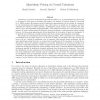Free Online Productivity Tools
i2Speak
i2Symbol
i2OCR
iTex2Img
iWeb2Print
iWeb2Shot
i2Type
iPdf2Split
iPdf2Merge
i2Bopomofo
i2Arabic
i2Style
i2Image
i2PDF
iLatex2Rtf
Sci2ools
CORR
2008
Springer
2008
Springer
Algorithmic Pricing via Virtual Valuations
Algorithmic pricing is the computational problem that sellers (e.g., in supermarkets) face when trying to set prices for their items to maximize their profit in the presence of a known demand. Guruswami et al. (2005) propose this problem and give logarithmic approximations (in the number of consumers) for the unit-demand and single-parameter cases where there is a specific set of consumers and their valuations for bundles are known precisely. Subsequently several versions of the problem have been shown to have poly-logarithmic inapproximability. This problem has direct ties to the important open question of better understanding the Bayesian optimal mechanism in multi-parameter agent settings; however, for this purpose approximation factors logarithmic in the number of agents are inadequate. It is therefore of vital interest to consider special cases where constant approximations are possible. We consider the unit-demand variant of this pricing problem. Here a consumer has a valuation ...
| Added | 09 Dec 2010 |
| Updated | 09 Dec 2010 |
| Type | Journal |
| Year | 2008 |
| Where | CORR |
| Authors | Shuchi Chawla, Jason D. Hartline, Robert Kleinberg |
Comments (0)

